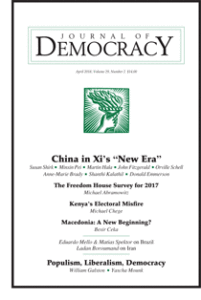
Center for a New American Security
The factors fueling populism are likely to persist; populism will be a fixture of politics for the foreseeable future, according to a new analysis. Given this outlook, liberal democratic actors must learn to compete responsibly and to contain the negative effects that populism can have on liberal democracy, Andrea Kendall-Taylor and Carisa Nietsche write in Combating Populism: A Toolkit for Liberal Democratic Actors:
Combating illiberal populism and restoring public faith in liberal democracy will require policies and approaches that address both the demand- and supply-side drivers of populism’s appeal. Doing the hard work of developing policies that are capable of addressing such contemporary challenges as inequality and migration will be critical to sustaining support for democracy. Liberal actors also will have to develop a vision for addressing future challenges, such as artificial intelligence and the future of work. These challenges will create new winners and losers—and could give renewed impetus to populism.
 Addressing these fundamental challenges will be key to the long-term resilience of democracy; in the short term, liberal actors must also consider the recommendations identified in the report, published by the Center for a New American Security:
Addressing these fundamental challenges will be key to the long-term resilience of democracy; in the short term, liberal actors must also consider the recommendations identified in the report, published by the Center for a New American Security:
These strategies and approaches will better equip liberal parties, elected officials, and candidates to activate broader support for their ideas and policies and translate that support into votes. Today’s populist players have managed to turn the tides and create conditions that are conducive to their illiberal ideas and agendas. Liberal democrats must now reclaim the initiative.
Harvard political scientist Pippa Norris is carefully precise in her definition of populism, and careful also to distinguish it from authoritarianism, which it often—but not always—accompanies, LYDIALYLE GIBSON writes for Harvard Magazine:
 Populism, she explains, is a type of rhetoric, an anti-establishment impulse: a belief that political power should reside not with economic, intellectual, or political elites, but with the people. In both the United States and Europe there exist populist parties that are also socially liberal—Spain’s Podemos Party, Greece’s Syriza, the Left party in Germany, the Socialist party in the Netherlands. In the United States, Bernie Sanders is a politician who combines populist, anti-elite rhetoric with socially liberal values. But more often, Norris observes, populist sentiment opens the door to authoritarianism, “Because it says that you can’t trust your legislators, even though they are elected; it says your representative won’t act for you, that parties are corrupt.”
Populism, she explains, is a type of rhetoric, an anti-establishment impulse: a belief that political power should reside not with economic, intellectual, or political elites, but with the people. In both the United States and Europe there exist populist parties that are also socially liberal—Spain’s Podemos Party, Greece’s Syriza, the Left party in Germany, the Socialist party in the Netherlands. In the United States, Bernie Sanders is a politician who combines populist, anti-elite rhetoric with socially liberal values. But more often, Norris observes, populist sentiment opens the door to authoritarianism, “Because it says that you can’t trust your legislators, even though they are elected; it says your representative won’t act for you, that parties are corrupt.”
The problem is that populism* is rhetoric without policy: “It’s like a barnacle that attaches itself to a rock,” adds Norris, co-author of Cultural Backlash….. In theory, it should lead to direct forms of popular democracy. But those mechanisms are often weak and difficult to organize and administer, “so in practice what happens is that the power comes to reside in an individual, charismatic leader, who represents the voice of the people.”
*An issue discussed at length in the National Endowment for Democracy’s Journal of Democracy (above)







